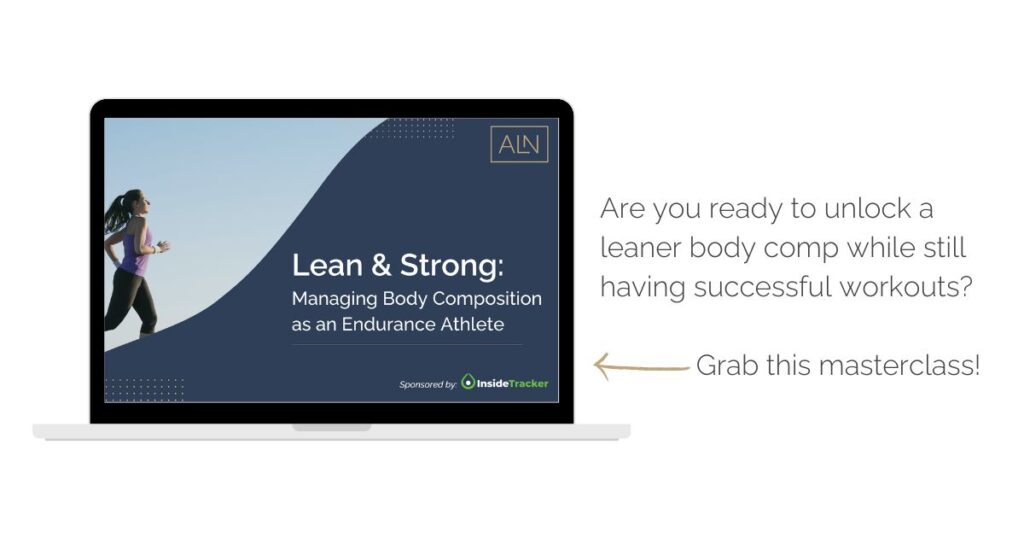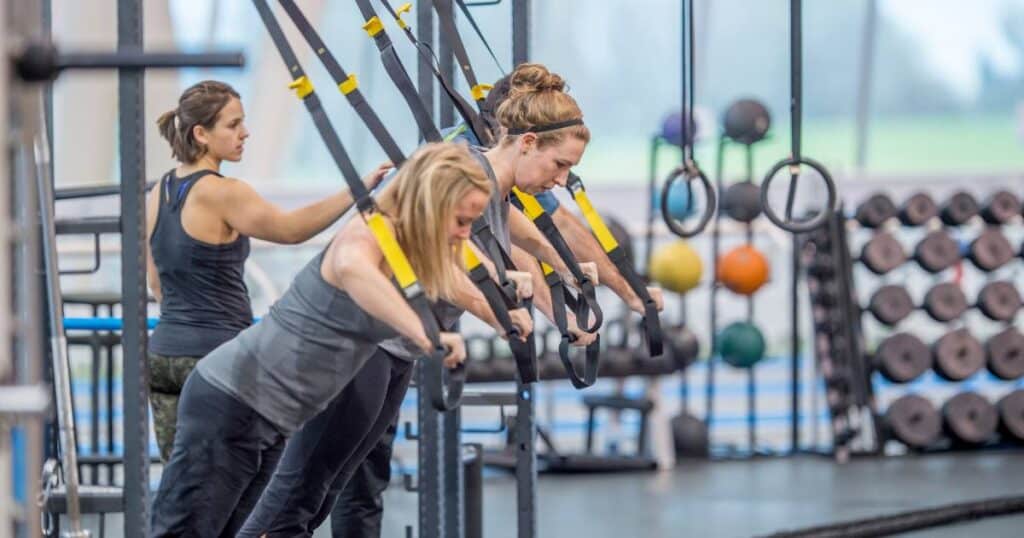RUNNING →
Level Up Your Nutrition Game With Our Freebies
Alex
I provide nutrition coaching for endurance athletes to improve performance and body composition through a simple and flexible eating style.
Hi, I'm
ATHLETE EATING GUIDE →
PROTEIN →
TRIATHLON →
RECIPES →
PERFORMANCE NUTRITION →
SUPPLEMENTS →
HOLIDAY & TRAVEL →
PLANT-BASED →
FEMALE ATHLETE NUTRITION
Explore the Blog
LEARN MORE →
ATHLETE GROCERY SHOPPING GUIDE →
10-DAY PROTEIN-PACKED SAMPLE MEAL PLAN
READY TO FUEL?
incredible value!
The fueling guide bundle serves as your one-stop-shop for strategies to fueling before, during and after your workouts.
For years we’ve been told to exercise more, move more and eat less and you’ll lose weight. But then, you start training more than ever and the scale has actually gone up. How is this possible? I see this happen often with athletes, and there’s a number of reasons why this happens. So let’s talk through the three most common reasons why athletes are exercising more and still gaining weight.
Diet Mentality – Fear of Athlete Weight Gain
But first, we need to talk about the big elephant in the room, and that’s fear. Are you afraid to gain weight? Does it freak you out? You’re not alone. And that fear may be holding you back in athletic performance and in improvements in body composition.
For many athletes, that fear of weight gain leads to restricting your food intake. It keeps you in a diet mentality and not a fueling mentality that is needed for endurance athletes doing high-volume training.
When you combine high-volume training with food restriction the result is:
- constant ravenous hunger,
- uncontrollable food cravings,
- low energy levels (and struggling to want to train more)
- and eventually leading to binge eating in the later hours of the evening. And the food choices during that binge are not aligned with lowering that body fat percentage.
And this leads us to the first reason why athletes are exercising more and still gaining weight.

1. You’re Overtraining and Underfueling
Underfueling for weight loss typically doesn’t work well when in a high-volume training block. It actually does a lot more harm than good and it can set you back from your goals. High-volume training is a lot of stress on the body and add on the layer on being under nourished it can wreck havoc on your hormone levels, metabolism, gut health, muscle mass and overall energy levels.
Eating balanced meals and snacks throughout the day will encourage high energy levels, prevent muscle breakdown, maintaining a high metabolic rate, these are all things you want to see to help you get leaner!
If you’re going to train a lot, you need to fuel a lot. With our athletes in the 1:1 program, it is magical when we start to align your nutrition with the training.
“I started the nutrition program thinking my nutrition was fine and I was skeptical that I’d be able to make impactful changes. I lost 12 pesky pounds while improving my running performance and increasing my strength. I realized I was in a sub-optimal nutrition rut.”
-Eli
2. You’re Eating Enough, But Not Optimizing Your Nutrition
“Am I overeating?”
“I must be eating too much as I continue to gain weight.”
I see athletes questioning whether or not they’re overeating all the time. And most of the time that’s not the case. Before worrying about calories in and calories out, it’s important to first focus on balancing macro- and micronutrients and nutrient timing.
Many athletes will either intentionally or unintentionally restrict their eating earlier in the day, leading to overeating later in the day. And later in the day when we tend to be more tired, means that our food choices aren’t ideal.
When balancing macronutrients, you’re actually prioritizing recovery from workouts. The recovery efforts are just as important as the training itself. Recovery includes rest days, getting enough sleep, and staying well hydrated. It includes consistently consuming the needed nutrients to help your body recover from your workouts, including repairing and rebuilding muscle and reloading muscle glycogen stores. Efficiently and effectively recovering from workouts will also help you prepare for the next workout, and this is where athletes will start to see bigger performance gains in their training.
These frequent little actions that you take will make a big difference in the long run with your body composition, strength and athletic performance.

Understanding and Accepting Inflammation and Water Fluctuations
This is a big one for those who are exercising more and still gaining weight. As athletes, we’re going to see weight fluctuations due to water retention and inflammation. It’s important to understand when and why they will happen and to not let it freak you out!
Let me walk you through a common scenario: An athlete steps on the scale and sees their weight has gone up 2-3 lbs. Panic sets in, and they will begin to restrict their eating for the next few days to try to bring their weight back down. This is NOT the right action to take when you see the scale jump up quickly.
The first action to take it think about why you could have seen the scale go up.

Muscle Inflammation
Exercise is stress on the body, and it’s that stress signals the body to adapt itself to get stronger, faster, and fitter. The result of said stress is inflammation and a result of this inflammation is retaining water to help with the repair process.
This is why after a race, athletes often see the scale go up in the days after the race. The same can happen after a tough training block. This is part of the process, where your body is adapting to the stress of exercise.
Once the inflammation calms, the water retention will decrease and your weight will return to normal.
Prioritizing your recovery nutrition post-exercise (aka: not restricting) will help reduce inflammation.
Muscle Glycogen Storage Comes with Super Powers… and Water Weight
Carbohydrates give endurance athletes superpowers. Carbs are needed to adequately fuel your exercise. When we’re not exercising and consume carbs, our body will convert it to glycogen (a form of glucose) and store it in our muscles to use in the future as energy.
For every gram of muscle glycogen stored, it also stores at least 3 grams of water. On average, muscle glycogen storage is about 500 grams, varying based on body size and other factors. With fully loaded glycogen stores, in addition to the water accompanying it, that’s well over 4 lbs of weight that can fluctuate.
This is why when people do restrictive fad diets they will see initial rapid weight loss. It’s simply glycogen stores being depleted and water weight being lost via urine.
This is also why when we have our athletes do a proper carb-loading protocol, we tell them to not step on the scale. Because we expect them to be up in weight and it’s not worth stressing over the number on the scale.
Are You Strength Training?
This is a bonus tip for endurance athletes wanting to get leaner. Even though I’m not an athletic trainer, in talking with run/tri coaches and experts in exercise physiology, the recommendation for endurance athletes is to strength train 2-3 times a week. I can not stress enough how important strength training is for runners, triathletes, and cyclists.
Building more lean muscle will significantly increase your metabolic rate because maintaining muscle requires over 2x the calories as fat does. Plus, it prevents sports injuries.
As we age, we gradually will lose lean muscle mass so incorporating some strength training into your workout regimen can play a huge role in supporting a leaner body composition and having longevity in your sport.

Be Patient. Play the Long Game with Body Composition.
Changing your body composition the RIGHT way takes 2-3x as long as you think it will. The reward in being patient is that it will be much easier to maintain that leaner body comp long term.
When you join my nutrition coaching program, the first few things that we focus on are making simple behavior changes within your eating pattern and we’ll review the composition of your meals and snacks to supply your body with the nutrition it needs for muscle gains and encouraging body fat loss.
This takes time to establish these habits consistently, but it’s the long-term habits that create long-lasting results.
If you’re looking to work with a dietitian on your nutrition, you’re in the right place. My dietitian team and I coach endurance athletes on improving performance and body composition through a flexible eating style that allows you to stop restricting and start thriving!
Get starting by filling out a nutrition coaching application and start taking action right now!
Alex
I provide nutrition coaching for endurance athletes to improve performance and body composition through a simple and flexible eating style.
Hi, I'm
LEARN MORE →
take the quiz!
Let's discover your Endurance Nutrition IQ
How well do you know your fueling? Answer these questions and let's see where your endurance nutrition knowledge is at!
Take the quiz
level up your nutrition game with these freebies
free downloadS
Protein-Packed 10-Day Sample Meal Plan
Athlete Eating Guide
Athlete Grocery Shopping Guide
1
2
3
Inspiration to fit 120 grams of protein into your day
Planning what goes on your plate
Putting the right foods in your grocery cart
